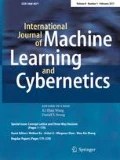Abstract
Social networks and semantic web has become more widespread these days. Lots of information has been exchanged between different people daily. The most important issue is the exchange of information between users is trust to the sources and to different users and there is no direct trust because of the vastness of the web in most cases and trust must be predicted in different ways. Extensive researches about trust predicting in social networks, online networks and semantic web has been done in recent years. In this article, we use trust mirroring to predict trust which estimates the amount of trust based on the similarity amount between trustor and trustee. In this article, we use parameters as degree, degree quality and local density in social networks to determine the similarity criteria and we offer fuzzy systems to calculate the amount of similarity for each of these parameters. Then we estimate the amount of trust considering the amount of trustor reputation and amount of similarity. The proposed method provides an acceptable estimation for trust based on the experimental results in the social networks.

















Similar content being viewed by others
References
Artz D, Gil Y (2007) A survey of trust in computer science and the semantic web. Web Semant Sci Serv Agents World Wide Web 5(2):58–71
Bhattacharyya P, Garg A, Wu SF (2011) Analysis of user keyword similarity in online social networks. Soc Netw Anal Min 1:143–158
Buskens V (2002) Social networks and trust. Kluwer academic publishers, New York, pp 32–39
Chen S, Wang G, Jia W (2015) K-Fuzzy trust: efficient trust computation for large-scale mobile social networks using a fuzzy implicit social graph. Inf Sci 318:123–143
Cheng Y, Liu J, Yu X (2016) Online social trust reinforced personalized recommendation. Pers Ubiquit Comput 20:457–467
Davoodi F, Kianmehr K, Afsharchi M (2013) A semantic social network-based expert recommender system. Appl Intell 39:1–13
Doreian P, Mrvar A (2009) Partitioning signed social networks. Soc Netw 31(1):1–11
Golbeck J (2006) Combining provenance with trust in social networks for semantic content filtering. in: Proceeding of the International Provenance and Annotation Workshop, Chicago, IL, USA. Lect Notes Comput Sci 4145:101–108
Golbeck J, Parsia B, Hendler J (2003) Trust network on the semantic web. in: Proceedings of Cooperative Information Agents VII, August 27–29, Helsinki, Finland. Lect Notes Comput Sci 2782:238–249
Guha R, Kumar R, Raghaven P, Tomkins A (2004) Propagation of trust and distrust. in: The 13th International Conference on World Wide Web, ACM New York, NY, USA, pp. 403–412
Guoyong C, Rui L, Jiliang T, Huan L (2014) Temporal dynamics in social trust prediction. Wuhan Univ J Nat Sci 19(5):369–378
Jamali M, Abolhassani H (2006) Different aspects of social network analysis. in: Proceedings of IEEE/WIC/ACM International Conference on The Web Intelligence (WI-06), 18–22 Dec, Hong Kong, pp. 66–72
Jarvenpaa SL, Tractinsky N, Vitale M (2000) Consumer trust in an internet store. Inf Technol Manag 1(1):45–71
Kamvar SD, Schlosser MT, Molina HG (2003) The Eigen trust algorithm for reputation management in p2p networks. in: The 12th International World Wide Web Conference, ACM New York, NY, USA, pp. 640–651
Kim YA, Phalak R (2012) A trust prediction framework in rating-based experience sharing social networks without a Web of Trust. Inf Sci 191:128–145
Kunegis J, Lommatzsch A, Bauckhage C (2009) The Slashdot zoo: mining a social network with negative edges. in WWW’09: Proc. of the 18th International Conference on World Wide Web. ACM, Madrid, pp 741–750
Matsuo Y, Yamamoto H (2009) Community gravity: measuring bidirectional effects by trust and rating on online social networks. In: Proceedings of the 18th International Conference on World Wide Web. ACM, New York, NY, pp 751–760
Richardson M, Agrawal R, Domingos P (2003) Trust management for the semantic web. in: The 2nd International Semantic Web Conference. Lect Notes Comput Sci 2870:351–368
Shafiq O, Alhajj R, Rokne JG (2015) On personalizing Web search using social network analysis. Inf Sci 314:55–76
Shekarpour, S., and Katebi, S.D. (2010) Modeling and evaluation of trust with an extension in semantic web. Web Semant Sci Serv Agents World Wide Web 8(1):26–36
Shirgahi H, Mohsenzadeh M, Haj Seyyed Javadi H (2016) Trust estimation of the semantic web using semantic web clustering. J Exp Theor Artif Intell. doi:10.1080/0952813X.2016.1199601
Shirgahi H, Mohsenzadeh M, Haj Seyyed Javadi H (2016) A three level fuzzy system for evaluating the trust of single web services. J Intell Fuzzy Syst. doi:10.3233/JIFS-152526
Skopik F, Schall D, Dustdar S (2009) Start trusting strangers? bootstrapping and prediction of trust. in: International conference on web information systems engineering (WISE), Springer, pp. 275–289
Skopik F, Schall D, Dustdar S (2010) Modeling and mining of dynamic trust in complex service-oriented systems. Inf Syst 35:735–757
Tang J, Gao H, Liu H, Sarma AD (2012) eTrust: Understanding Trust Evolution in an Online World. The Eighteenth ACM SIGKDD International Conference on Knowledge Discovery and Data Mining, ACM New York, NY, USA, pp. 253–261
Toch E, Berger IR, Dori D (2011) Humans, semantic services and similarity: A user study of semantic Web services matching and composition. Web Semant Sci Serv Agents World Wide Web 9:16–28
Turel, O., Yuan, Y., and Connelly, C.E. (2008) In justice we trust: predicting user acceptance of e-customer services. J Manag Inf Syst 24(4):123–151
Yuan W, Guan D, Lee YK, Lee S, Hur SJ (2010) Improved trust-aware recommender system using small-wordless of trust networks. Knowl Based Syst 23(3):232–238
Zolfaghar K, Aghaieb A (2011) Evolution of trust networks in social web applications using supervised learning. Procedia Comput Sci 3:833–839
Author information
Authors and Affiliations
Corresponding author
Rights and permissions
About this article
Cite this article
Shirgahi, H., Mohsenzadeh, M. & Javadi, H.H.S. A new method of trust mirroring estimation based on social networks parameters by fuzzy system. Int. J. Mach. Learn. & Cyber. 9, 1153–1168 (2018). https://doi.org/10.1007/s13042-017-0638-z
Received:
Accepted:
Published:
Issue Date:
DOI: https://doi.org/10.1007/s13042-017-0638-z




